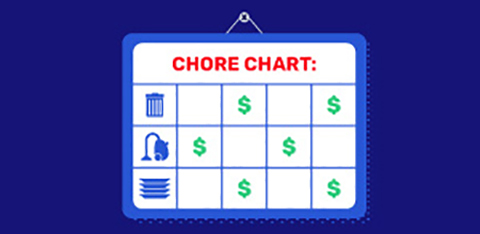Teaching your kids about the value of money is important. Most kids carry the money lessons they learn from their parents for the rest of their lives. In fact, some scientific studies have shown that, by the age of seven, many peoples’ money habits are set for good. One of the best and most direct tools parents have for imparting money lessons to their kids is an allowance. Allowances can help your kids learn critical financial lessons that will aid them in managing their money long after they’ve grown up and are on their own. Therefore, if you’d like to put your children on track for managing their money wisely, here are four rules on how an allowance teaches smart money skills.
1. Make the Allowance Performance-based
If you merely hand over money to your children every week, they’re not going to learn any valuable financial lessons from their allowance. Instead, you should define exactly how much the allowance is and how it will be earned. The pay and performance expectations you give can include matters such as household chores or other requirements that you expect your children to meet each week. However you decide to lay them out, your children should understand the expectations they’ll have to meet to earn the allowance. Meeting those expectations each week will help your children link their positive performance to financial compensation, and it’ll teach them valuable lessons about money, work ethic, and responsibility.
2. Have Your Children Allocate their Allowance Money
Allowance teaches smart money skills you can impart to your children such as how to allocate the money they earn. A key part of laying out the ground rules for your kids’ allowance should be how they use it. Require them to develop a written plan for how much of the money they earn is going to go into savings for important life goals such as college, school supplies, etc., as well as how much they can spend freely. This may be a good time to open a savings account for your child as a way to save money and learn about concepts such as interest.
You may want to suggest that your kids choose another, separate, savings goal, for items such as a new computer, phone, or something else they want. You could also encourage your children to give a portion of their allowance to a charity that does important work to introduce your kids to the importance of philanthropy. Mandating an earnings allocation plan will teach your kids some rudimentary but important lessons about how to budget money. Requiring them to save for an expensive item they want will also provide a good lesson in financial discipline.
3. Let Kids Make Mistakes with Money, and Talk about Those Mistakes
Once your kids make a plan for allocating their allowance money, let them run with it for a while, even if it goes a bit off the rails. If they end up missing opportunities due to poor savings and spending habits, let it happen, and then call a timeout for a teachable moment. You can carefully have your children point out the mistakes they made with their money, and then suggest some better ways for them to manage their money in the future. Discussing the financial missteps your kids make can be a powerful tool for learning valuable lessons and strengthening lifelong, positive financial habits. This will help your kids recover from early financial mistakes and demonstrates that an allowance teaches smart money skills.
4. Pay the Allowance in Cash and Be Consistent
Always pay your kids’ allowances in cash, not some sort of in-kind trade such as a trip to the movies or the purchase of some item. The cash payment will reinforce the value of money to your kids and make them think about how to allocate what they earn. You should also ensure that you’re consistent about paying your kids on the set day and time their allowance comes due. This will help impart to them the value of their work and performance. Finally, ensure you don’t link the allowance to your kids’ behavior. If they’ve done what they were supposed to do for the week to earn the allowance, don’t threaten to withhold payment if they don’t behave a certain way. Overall, try to make your kids’ first experience with money as positive and stress-free as possible.
The sooner your children learn about financial responsibility, the better. Allowances can be great tools to teach your children about the importance of performing their jobs well and how to allocate the money they’ve earned responsibly. If done correctly, an allowance teaches smart money skills and can set up a lifetime of positive financial management. So, consider the four rules on allowance money discussed here, and get your kids on the path to financial responsibility today.





